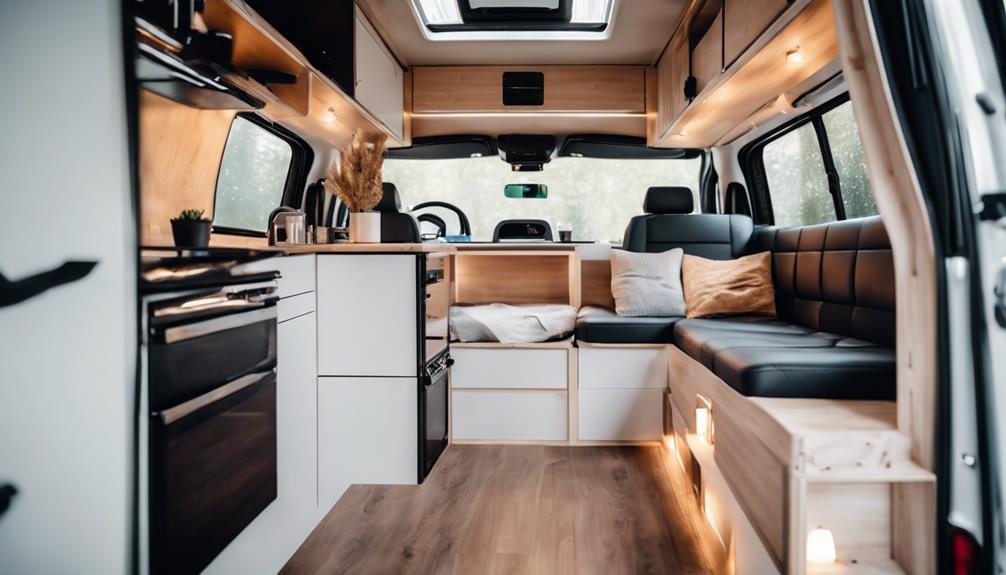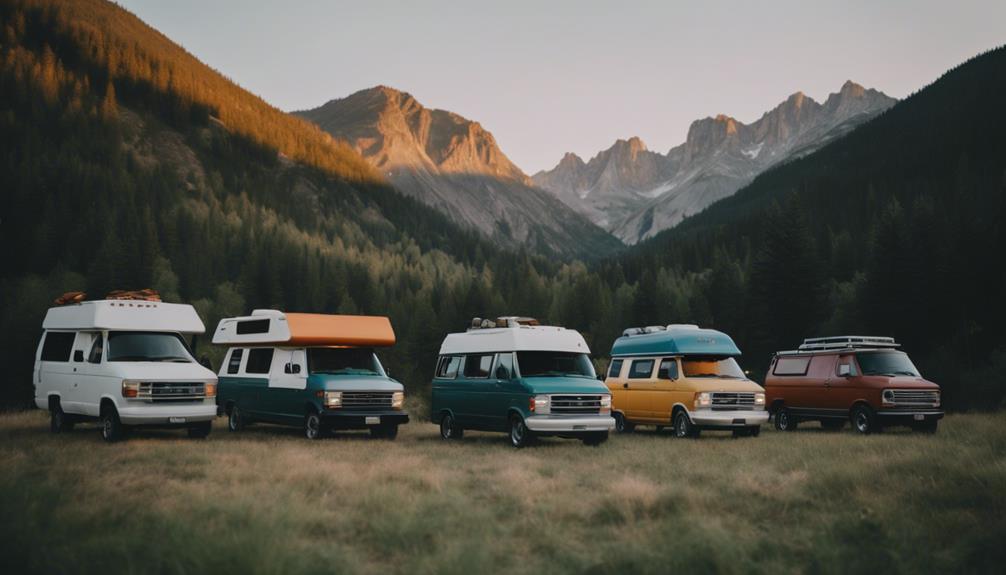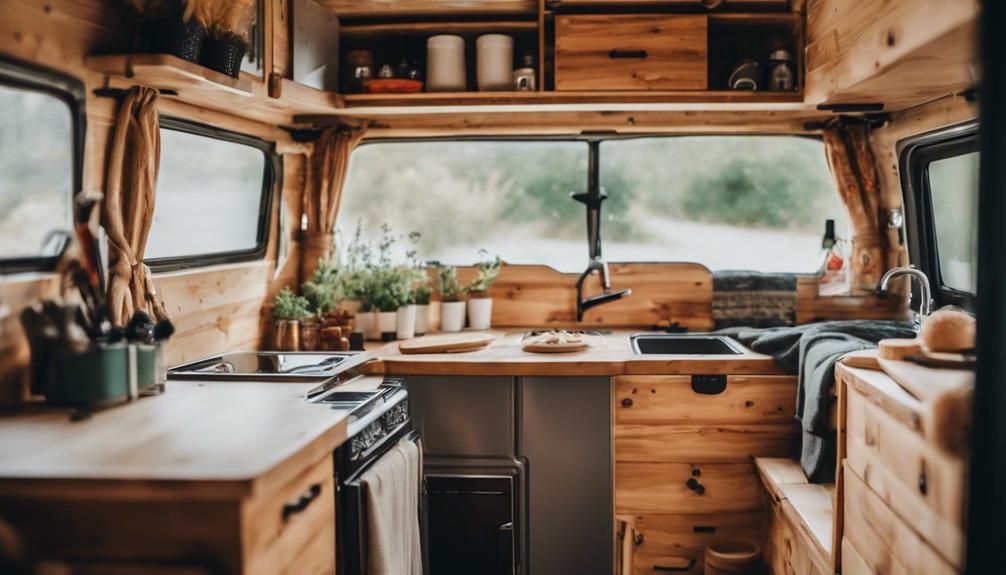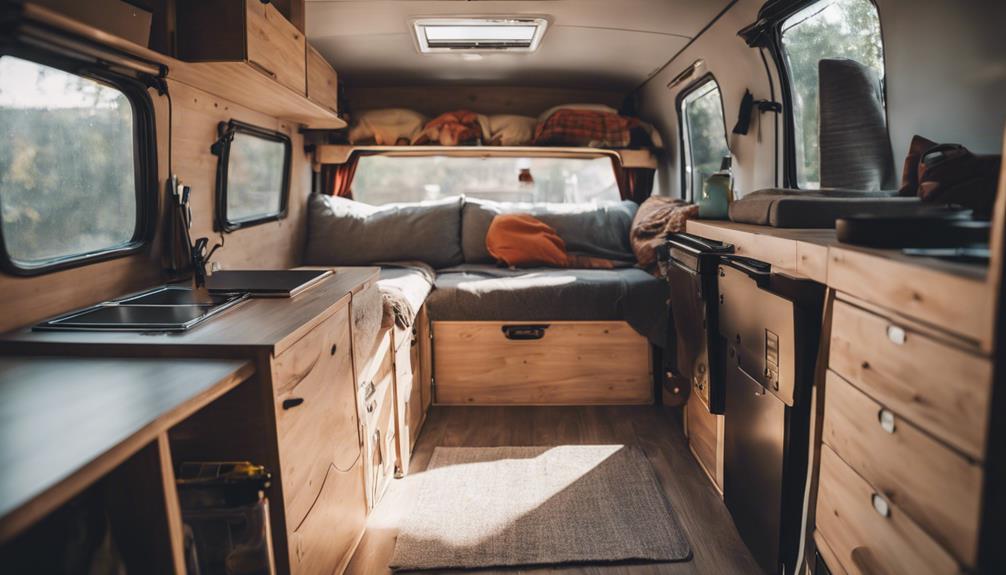When you're selecting a van for camper conversion, consider the Mercedes Sprinter for its spacious interior and high build quality, making it perfect for creative layouts. The Ford Transit offers versatile sizes and excellent customization options, while the Ram ProMaster balances affordability with practicality. If you're looking for a more budget-friendly option, the Nissan NV3500 is worth considering for its generous cargo space. Each model has unique strengths, so think about your needs and travel style. Curious about the specific features and costs to factor in? There's more information that can help you make the best choice.
Introduction
When you're considering a camper conversion van, choosing the right model can make all the difference in your adventure. Your choice of van will directly impact the success of your conversion project. Among the top choices are the Mercedes Sprinter, Ford Transit, and Ram ProMaster, each offering unique advantages for van life enthusiasts.
The Mercedes Sprinter is known for its high build quality and fuel efficiency, making it a reliable option for long journeys. Its spacious interior allows for creative layouts that can accommodate essential amenities like sleeping and cooking spaces.
On the other hand, the Ford Transit provides various sizes and excellent versatility for customization, which can be a game-changer in your conversion plans.
If you're leaning toward DIY van conversions, keep in mind that these popular models can serve as a solid foundation for your project. The Ram ProMaster also deserves mention, offering a balance of affordability and practicality.
Regardless of your choice, focusing on size, reliability, and fuel efficiency will guarantee your camper conversion meets your adventure needs. With the right van, you're one step closer to hitting the road and embracing the freedom of van life.
Background Information
The early van life movement sparked a love for travel and adventure that inspired many to transform their vehicles into homes on wheels.
As you explore the rise of DIY conversions, you'll see how creativity and resourcefulness allow individuals to craft personalized spaces that meet their unique needs.
Understanding this background helps you appreciate the evolution of camper conversions and their impact on modern road trips.
Early Van Life Movement
During the 1960s and 1970s, a growing desire for freedom and adventure on the open road sparked the early van life movement, deeply entwined with the era's counterculture. The VW Bus emerged as an iconic symbol of this movement, celebrated for its unique design and adaptability as a camper van. Many people embraced camper vans for road trips, outdoor recreation, and a sense of community during festivals and gatherings, aligning perfectly with the hippie spirit of the time.
As living in a vehicle became a viable lifestyle choice, individuals sought a minimalist lifestyle and self-sufficiency, reshaping their definition of home. This pursuit of freedom and simplicity resonated with countless adventurers who found joy in the open road.
Fast forward to the 2010s, and social media played a pivotal role in reigniting interest in van life. Platforms allowed enthusiasts to share their experiences, tips, and custom conversions, contributing to a resurgence in camper van popularity.
The early van life movement laid the groundwork for this ongoing journey, inspiring a new generation to embrace the freedom and adventure that comes with life on the road.
Rise of DIY Conversions
As interest in van life grows, more people are embracing DIY conversions to create personalized mobile homes that reflect their unique lifestyles.
With the rise of remote work, you might find that camper van conversions offer the perfect blend of travel and flexibility. Many DIY enthusiasts are investing between $5,000 and $15,000 into their projects, allowing for tailored features and layouts that suit their needs.
The availability of modular furniture and conversion kits simplifies the process, making it accessible for first-timers. You'll discover a thriving online community where DIYers share tips, resources, and inspiration, helping you navigate your own conversion journey. Renting a camper van before committing to a purchase can also be a smart move; it helps you identify your preferred features and avoid costly mistakes.
As sustainability becomes a priority in van life, many conversions now incorporate eco-friendly materials and energy-efficient systems. This trend not only enhances your mobile living experience but also aligns with a growing commitment to sustainable travel.
Recent Conversion Innovations

You're likely excited to explore the latest innovations in camper van conversions that are transforming the way you travel.
From advanced insulation materials that enhance comfort to emerging technologies that make your van more efficient, there's a lot to contemplate.
Let's take a closer look at how these innovations can elevate your camping experience.
Emerging Camper Van Technologies
Emerging camper van technologies are transforming the way you experience travel, offering innovative solutions that enhance comfort, efficiency, and sustainability.
For instance, advanced solar power systems enable you to live off-grid by generating over 1,000 watts of power, allowing you to run various appliances without relying on external sources. Smart home integration is also gaining popularity, letting you control lighting, thermostats, and security systems through your smartphone for added convenience.
Moreover, utilizing flexible materials like composite panels and aluminum framing boosts fuel efficiency and facilitates custom van layouts without compromising structural integrity. The introduction of innovative water filtration systems means you can purify water from natural sources, providing safe drinking water while reducing reliance on bottled options.
Lastly, modular furniture designs, including foldable beds and expandable kitchenettes, maximize space efficiency, catering to the needs of van lifers who seek versatile living solutions.
These technologies not only improve your travel experience but also contribute to a more sustainable lifestyle, making camper van conversion an exciting option for modern adventurers.
Advanced Insulation Materials
Recent innovations in camper van conversions have introduced advanced insulation materials that greatly enhance thermal efficiency and comfort, ensuring a more enjoyable travel experience. One standout option is spray foam insulation, known for its impressive air sealing properties. It expands to fill gaps, providing exceptional temperature regulation and a high R-value per inch, making it ideal for various climates.
You might also consider rigid foam boards, which are lightweight yet offer excellent thermal resistance. These boards can be used alongside other materials to optimize space without sacrificing performance. If you're environmentally conscious, eco-friendly insulation options like sheep's wool and recycled denim provide excellent breathability and moisture control while minimizing your environmental impact.
Additionally, advancements include soundproofing materials that help reduce road noise, making your travels quieter and more comfortable. By incorporating these advanced insulation materials, you can considerably improve your camper van's comfort and efficiency, ensuring a cozy retreat no matter where your adventures take you.
With the right insulation, you'll enjoy a perfectly regulated environment, free from unwanted moisture and noise.
Cost-Benefit Evaluation
When evaluating the costs and benefits of camper conversion vans, you need to contemplate both the advantages and disadvantages of your options.
Industry experts can provide valuable insights, helping you weigh different models and their performance.
Understanding these factors will guide you in making a smart financial decision for your camper conversion project.
Advantages and Disadvantages
Camper conversion vans present a unique mix of advantages and disadvantages that can greatly impact your budget and travel experience.
When considering popular van models like the Ford Transit, Mercedes Sprinter, and Ram ProMaster, cost plays a significant role. The Sprinter, while offering excellent customization potential, comes with a higher initial price of around $53,400 and potentially higher maintenance expenses, ranging from $3,000 to $5,000 over five years. In contrast, the more budget-friendly Ram ProMaster starts at about $50,000 but may depreciate faster, affecting your resale value.
Fuel efficiency is another critical factor. The Sprinter averages 20 mpg, making it a more economical option for long trips, while the Transit offers 15 mpg city and 19 mpg highway. The ProMaster, however, lags behind with 14-16 mpg city and 19-21 mpg highway.
Balancing these advantages and disadvantages can help you make an informed decision on which van suits your camper conversion needs best. Ultimately, evaluating your budget, intended use, and personal preferences will guide you toward the right choice for your adventures.
Industry Expert Insights
Experts agree that evaluating the cost versus benefits of camper conversion vans is essential for making a smart investment that aligns with your travel ambitions.
When you consider options like the Ford Transit, Mercedes Sprinter, and Ram ProMaster, understanding the initial purchase costs and conversion expenses becomes vital.
The Ford Transit starts at around $20,000 for used models, making it a solid choice for budget-conscious converters. If you're looking for the most economical option, the Ram ProMaster offers used models from about $9,000, which is quite budget-friendly. However, keep in mind that Mercedes Sprinter vans, while more expensive, typically retain higher resale value due to their durability and popularity.
Conversion costs can also vary widely, with basic camper setups starting around $7,500 and luxurious builds exceeding $100,000. It's important to align your budget with your desired level of customization.
Model Performance Evaluation
Evaluating the performance and costs of different van models helps you pinpoint which camper conversion aligns best with your budget and travel needs.
The Ford Transit starts at around $20,000 used, offering extensive customization options and lower maintenance costs between $2,500 and $4,000 over five years. This makes it a solid choice if you want value without breaking the bank.
On the higher end, the Mercedes Sprinter has a hefty price tag, ranging from $27,000 used to over $50,000 new. However, its strong resale value and durability—often lasting over 300,000 miles—can justify the investment for long-term travelers.
If you're looking for an affordable option, the Ram ProMaster is your best bet, priced between $9,000 used and $45,000 new. While it may fall short in fuel efficiency and resale value, it's budget-friendly.
Lastly, the Nissan NV3500 offers generous cargo space for various custom layouts, making it ideal for urban environments, though its new price is around $25,000.
Weigh these factors to decide which model best suits your camper conversion dreams.
Essential Tools for Conversion

When you start your camper conversion, having the right tools is vital for a smooth process.
You'll need to prioritize safety while efficiently tackling each step of the transformation.
Let's explore the essential tools that will help you achieve your vision while keeping safety at the forefront.
Conversion Process Overview
To successfully convert a van into a comfortable camper, you'll need a variety of essential tools to tackle different aspects of the project efficiently.
A power drill is fundamental for mounting and assembly tasks, while a circular saw lets you cut wood and materials precisely. Don't forget a jigsaw for those intricate cuts around windows and curves.
Accurate measurements are critical in your camper van conversion, so keep a measuring tape handy to confirm that elements like beds and cabinets fit a family comfortably.
Insulation is key to maintaining a pleasant temperature, and having the right insulation tools like a utility knife and foam board cutter will help you insulate the walls, floor, and ceiling effectively.
For any electrical installations, you'll need the proper electrical tools such as wire strippers, crimpers, and a multimeter to safely set up lighting and power systems.
Finally, a level guarantees your cabinets and appliances are aligned, maximizing interior space and functionality.
Safety Precautions for Conversions
Prioritizing safety during your camper van conversion is crucial, so make certain you have the right personal protective equipment (PPE) on hand, including gloves, safety goggles, and masks.
Using tools like a power drill and jigsaw can make the conversion process easier, but it's critical to handle them with care. The power drill is necessary for securing fixtures, while the jigsaw helps you cut materials precisely.
A multimeter is another essential tool; it allows you to test circuits and guarantee safe electrical installations throughout your camper van.
Don't forget to use a level to make certain all your installations, such as cabinets and beds, are properly aligned. This prevents functionality and aesthetic issues down the line.
Lastly, a measuring tape is indispensable for accurate measurements of both space and materials. This will help you avoid costly mistakes during the conversion process.
What are the top factors to consider when choosing a van for camper conversion?
When looking for the best camper conversion vans, it’s important to consider factors like size, fuel efficiency, and interior layout. Choose a van that can accommodate your needs for sleeping space, storage, and amenities. Additionally, consider the ease of maintenance and availability of replacement parts for the van.
What are the Top Picks for Vans for Camper Conversion?
Looking for the best van for camper conversion? The top picks include the Mercedes Sprinter, Ford Transit, and Ram Promaster. These vans offer ample space, good fuel efficiency, and a reliable reputation for camper conversions. Consider your needs and budget to find the best van for your camper conversion project.
Conclusion
In choosing the right camper conversion van, it's essential to weigh the unique strengths of each model against your specific travel needs and budget.
The Mercedes Sprinter is often a top choice due to its robust build quality and spacious interior, offering extensive customization options for your camper conversion.
If you prioritize fuel efficiency and flexibility, the Ford Transit delivers multiple size configurations, making it adaptable for various projects.
Meanwhile, the Ram ProMaster stands out with its budget-friendly pricing and front-wheel drive, enhancing maneuverability in urban settings.
Each model has its unique advantages, from towing capacity to durability, which can influence your decision.
When considering your budget, take note of the price range for used models—starting around $27,000 for the Sprinter and approximately $20,000 for the Transit.
Ultimately, the best van for camper conversion will depend on how well it aligns with your lifestyle and travel preferences.
Evaluate your options carefully, and you'll find the perfect van that not only meets your budget considerations but also provides an enjoyable and comfortable adventure experience.
Frequently Asked Questions
What Is the Best Van for Conversion to Campervan?
When choosing the best van for conversion, consider your needs and budget. The Mercedes Sprinter, Ford Transit, and Ram ProMaster excel in space and flexibility, while smaller models suit solo travelers or those needing less room.
What Is the Most Reliable Used Conversion Van?
If you're searching for the most reliable used conversion van, consider the Mercedes Sprinter or Ford Transit. Both offer durability and low maintenance issues, especially models with mileage under 50,000 for better long-term performance.
What Is the Best Budget Van to Convert to Camper?
If you're looking for a budget-friendly option to convert into a camper, consider the Ram ProMaster City. It's affordable, has decent space, and offers great potential for customization to suit your van life needs.
What Order Do You Convert a Van to a Camper?
To convert a van into a camper, start with planning your layout, then strip the interior, install insulation, set up electrical and plumbing systems, and finally, construct your furniture and kitchen for ideal functionality.
Conclusion
To sum up, choosing the right van for your camper conversion can make all the difference in your adventure.
With the latest innovations and a clear understanding of your budget, you're well-equipped to transform your vehicle into a cozy home on wheels.
Remember to gather essential tools and plan your layout carefully.
Embrace the journey ahead, and enjoy the freedom that comes with a customized camper.
You're just a few steps away from hitting the open road!










